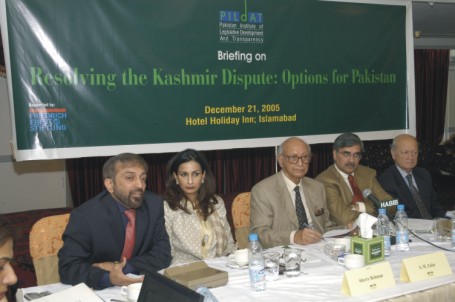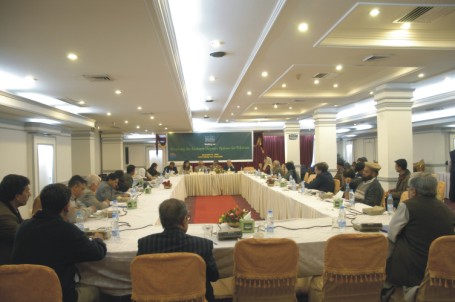|
|
| |
| EVENTS |
|
|
> Parliament to be consulted before presenting policy options on Kashmir
|
| |
|
Parliament to be consulted before presenting policy options on Kashmir
December 21, 2005
Hotel Holiday Inn; Islamabad
|
|
| |
Geo-Political environment dictates that Pakistan and India no longer have the option to adopt military-solution of the Kashmir issue. However, Pakistani government needs to take caution in forwarding various proposals to India for the resolution of the issue without first getting across-party support and agreement on these proposals. The rightful forum for achieving this agreement are Parliamentary committees. These views were expressed by speakers and participants of the PILDAT Briefing on Resolving the Kashmir Dispute: Options for Pakistan which was held at Islamabad today. |
|
| |
Senator S. M. Zafar, Chairman Senate Functional Committee on Human Rights, Dr. Farooq Sattar, Chairman National Assembly Foreign Relations Committee, Ms. Sherry Rehman, MNA and Chairperson Policy Planning Wing of PPPP and Lt. Gen. (Retd.) Talat Masood spoke on the issue while prominent among participants were MNAs and Senators from various political parties, analysts and opinion makers, representatives of business community and media representatives.
|
|
| |
Presenting the rationale behind holding the briefing on the topic, PILDAT Executive Director Mr. Ahmed Bilal Mehboob said that the Kashmir dispute appears to be at a critical stage and it seems that the nation will soon be required to make some important decisions in this regard and these decisions may not be easy. Parliamentarians, opinion makers, business community, media and the citizens are important stakeholders and their well-considered input to the option of resolution of Kashmir issue are required. Understanding the need for an informed discourse on the issue, PILDAT, as an independent non-partisan institute, decided to hold this briefing. PILDAT also prepared a briefing paper carrying concise details of proposed solutions of the Kashmir dispute forwarded by different individuals, institutions and states since 1947 to-date which was distributed amongst participants. He reiterated PILDAT view that institutional involvement of Parliament and political parties represented in the Parliament as public representatives is necessary in policy-formulation of any kind and it was important that Parliament and its relevant committees are briefed and consulted before any policy proposals are forwarded on the issue. |
|
| |
In presenting his analysis, Lt. Gen. (Retd.) Talat Masood said that no country has been as obsessed and involved in Kashmir as Pakistan. Kashmir has become a fault line between Pakistan and India. In the post 9/11 scenario, international environment can not permit militancy for freedom struggles and Pakistan realises that militancy is no longer an option. Therefore, there is a greater emphasis on political solution now. A policy shift has occurred which has included Kashmiris in this process as well and a solution has to be sought today which is acceptable to Pakistan, India and the Kashmiris. He said that there is an increasing view that UN resolutions regarding plebiscite for self-determination of Kashmiri people are no longer valid. United Nation�s Secretary General has also commented that that these resolutions have lost their relevance. While Pakistan has forwarded many proposals for resolution of the dispute such as demilitarisation and self-governance, etc, there is silent on India�s part on these options. Progress could be achieved on these if greater detail is presented to India on these proposals but it is also pertinent that Pakistani stakeholders are on board on these proposals beforehand. He said that Kashmiri political elements need to be recognised in this process but a question of which Kashmiri leaders to involve will also arise. Pakistan has to understand that militancy has had a destabilising effect on Pakistani state. He said that in 1987, India applied the Algerian formula in Indian-held Kashmir by denying Kashmiris their just right of self-determination, but there is an increasing realisation in India that principles of democracy, fairness and secularism need to be applied to Kashmiris also. He said that political dynamic to the resolution of this issue needs to be pursued which may, in time, evolve into a solution. |
|
| |
Ms. Sherry Rehman said that PPP has a position on the resolution of Kashmir issue since before Simla agreement. PPP has always believed in dialogue and undertook initiatives in the tenures of Prime Minister Mohtarma Benazir Bhutto which are still today on the list of CBMs between India and Pakistan. She criticised the one-man options forwarded by President Gen. Pervez Musharraf to the resolution of this issue and demanded that parliamentarians and civil society needed to be consulted before any proposals were forwarded. Parliamentary committees are the legitimate forum for consultation and achieving consensus and the present regime continues to bypass these institutions. PPP strongly believes that we should use expertise that years of various tracks of work on this issue yielded. PPP has always rejected military solution to the problem and rejected Kargil operation which was offered as a solution to Mohtarma Benazir Bhutto in her tenure as PM. Her party, she said, holds that 50 years worth of policy cannot be abandoned at personal will. While creative solutions need to be evolved in consultation with all stakeholders nationally and with India and Kashmiris, UN resolution still has a value which should not be discounted. She believed that it would take a while for a solution to evolve and it cannot be imposed. An option closer to the Irish model may evolve for the resolution which would be acceptable to PPP. She said that PPP recognises all CBMs and the opening of 5 points across LoC. She believed that UN should also be re-activated in the process of resolution of Kashmir issue. She stressed that discussion for the options of resolution of Kashmir has to originate in Parliament and not in the GHQ. |
|
| |
Dr. Farooq Sattaere economic diktats govern international policies, Pakistan has to be pragmatic in its approach towards the resolution of the Kashmir problem. He believed that all stakeholders, including military, are responsible for the quagmire Pakistan finds itself in today vis-�-vis India. He said that out-of-the-box mindset is required for finding a lasting solution to Kashmir issue and the country can not continue to romanticise with UN resolutions. He believed that a Talk, Trade and Trust approach was the need of the hour. |
|
| |
In presenting his analysis, Senator S. M. Zafar said that he agreed with previous speakers that military solution to Kashmir is no longer an option. This is an era which can be characterised as a Quest for Peace. He believed that while Pakistan has honoured its commitment on CBMs such as stopping cross-border infiltration, its important to note that India has not moved ahead on demilitarisation or stopping human rights violations in Indian held Kashmir as was demanded of it by Pakistan as a CBM. He believed that UN resolutions were still valid and applicable to the resolution of this issue while those did not stop Pakistan and India from looking for creative solutions to resolve the issue. He said that while he believed a more inclusive approach was required nationally on proposals before they were indicated to India, it was a fact that Pakistan has shown great flexibility and a time has come that Parliament in Pakistan should demand that India should move ahead and show flexibility on demilitarisation and stopping human rights abuse in Kashmir. |
|
| |
An interactive Q&A and Discussion session ensued after the main speeches. Major points raised during the discussion revolved around the validity and applicability of the UN resolutions to the issue. It was suggested by Mr. M. P. Bhandara, MNA that Pakistan should first put its own house in order and hold a referendum under UN in Azad Jammu and Kashmir. To resolve the issue of cross-border terrorism, Pakistan should help India build a wall around the LoC. He suugested that Pakistan should swap areas where there are no issues such as Laddakh, Jammu should be given to India. |
|
| |
MNAs from MMA highlighted that a solution to the issue should be discussed which takes into account the plight of Kashmiris at the hands of Indian atrocities. While taking a pragmatic solution, Pakistan should not forget the ground realities. Its not militancy but freedom fight that Kashmiris wage against India.
Mr. Tayyab Siddiqui was of the view that expressions such as jihadis, militants etc are loaded expressions and it doesn�t suit Pakistan to use such expressions. While it is imperative for Pakistan to seek a resolution for the Kashmir problem, it is only an option for India. UN resolution is the only constitutional legal claim of Pakistan over Kashmir. He believed that if China can wait 99 years for Hong Kong, Pakistan can wait too as hasty decisions won�t be in the interest of Pakistan. |
|
| |
|
|
| |

(From left to right) Dr. Farooq Sattar, Ms. Sherry Rehman, Senetor S. M. Zafar, Ahmed Bilal Mehboob, Lt. Gen. (Retd.) Talat Masood |
|
| |
|
|
| |

Participants at the dialogue |
|
|
|
|
|
|
|
|